Healing Family Wounds: A Holistic Approach
Family is meant to be a source of love, support, and nurturing. However, just like any other relationship, family dynamics can sometimes be challenging and complex. Family wounds, whether they stem from past traumas, misunderstandings, or ongoing conflicts, can have a significant impact on our mental well-being. We'll explore how a holistic approach, combining supportive therapy and medication management, can help heal family wounds and create a path to a healthier, happier family dynamic.
Understanding Family Wounds
Family wounds can manifest in various ways, such as unresolved conflicts, strained relationships, and deep-seated emotional pain. These wounds often have an adverse impact on our mental health, leading to conditions like anxiety, depression, or even post-traumatic stress disorder (PTSD).
Recognizing these wounds is the first step to healing. Often, these wounds are linked to a range of issues, from intergenerational trauma to communication breakdowns. Integrative psychiatry offers a comprehensive approach to identify and address these issues, focusing on the individual, their family, and the interaction between them.
Supportive Therapy: Nurturing Emotional Healing
Supportive therapy is a cornerstone in the healing of family wounds. It offers a safe and non-judgmental space for individuals and families to express their feelings, identify root causes of their wounds, and work toward resolution. Here are some key aspects of supportive therapy in family healing:
1. Communication Rebuilding: Effective communication is the foundation of healthy family relationships. Therapy can teach family members essential communication skills to express their emotions and needs.
2. Conflict Resolution: Therapy helps individuals and families learn how to resolve conflicts in a constructive manner, fostering understanding and empathy.
3. Healing Past Trauma: Family wounds often have deep roots in past traumas. Therapists can guide individuals through the healing process, helping them confront and manage traumatic experiences.
4. Strengthening Bonds: Therapy is a space where family members can rebuild trust, deepen their connections, and ultimately strengthen their relationships.
Medication Management: Balancing Brain Chemistry
In some cases, the healing process may require medication management. Mental health conditions like anxiety, depression, or bipolar disorder can exacerbate family wounds. Proper medication management can help stabilize brain chemistry, making it easier for individuals to engage in the therapeutic process.
Lynn A. Dana, PLLC takes a holistic approach to medication management, considering not only the individual's mental health but also how it fits into the broader context of their family dynamics. Medication can provide the stability needed to actively engage in therapy and work on resolving family wounds.
A Collaborative Approach to Healing
The healing of family wounds is not a one-size-fits-all process. It's a unique journey for every family. Integrative psychiatry offers a collaborative approach that combines the power of supportive therapy and medication management. This comprehensive strategy addresses the emotional and chemical imbalances, providing individuals and their families with the tools they need to heal, grow, and create a more harmonious family environment.
Family wounds may run deep, but with the right approach, they can heal. We are here to support you and your family on this journey to emotional well-being, offering a path towards happier, healthier relationships. As a trusted mental health medication provider, we're dedicated to your well-being.
